Writing: Plays
Natalia Ginzburg
Natalia Ginzburg was an Italian novelist, short story writer, essayist, and political activist. Ginzburg is considered one of the greatest Italian writers of the twentieth century, and her award-winning literary work is recognized for its exploration of family relationships and politics throughout fascism in modern Europe and during World War II.
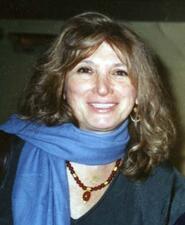
Nora Glickman
Argentine-born Nora Glickman is a prolific dramatist and short story and non-fiction writer, translator, editor, and professor of Latin American literature.
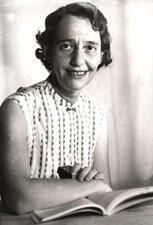
Lea Goldberg
Luba Robin Goldsmith
In 1902, Luba Robin was the first woman to graduate from the school of medicine at the Western University of Pittsburgh (later the University of Pittsburgh). Her career combined private medical practice, teaching, writing, lecturing, and active participation in educational, social, and public health work.
Sophie Von Grotthuss
Born in Berlin, Sophie von Grotthuss grew up with a mother who resented her Judaism and who married her off at fifteen into an unhappy relationship. In her later years she became a prolific author, but only a few of her works, including a story and a play, have survived.
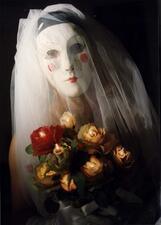
Hebrew Drama: Representation of Women
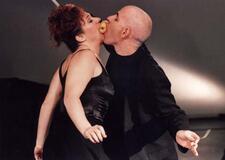
Hebrew Theater: Yishuv to the Present
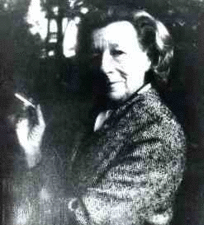
Lillian Hellman
Controversial both during and after her life, Lillian Hellman was one of the leading women of letters of mid-century America and a pioneer woman playwright. Hellman displayed courage not only in writing powerful plays like The Children’s Hour but also in her public refusal to name colleagues to the House Un-American Activities Committee.
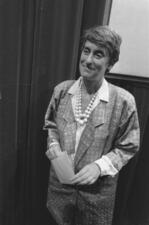
Judith Herzberg
Judith Herzberg is a Dutch Jewish poet, essayist, screenwriter, and professor who has been hailed as one of the greatest living Dutch poets for her ability to imbue everyday objects with unexpected meaning. Making her debut as a poet in the early sixties, Herzberg has written poems, essays, plays, film scripts, and television dramas, with many translations and adaptations to her name.
Holocaust Literature
Literature by and about women and the Holocaust explores the impact of the Nazi genocide on women during and after the war, its impact on subsequent generations, and the reflections of women on the implications of the Holocaust. Encompassing a range of literary genres, including fiction, poetry, drama and memoir, women’s Holocaust writing explores the intersection of history, imagination, Jewishness and gender.
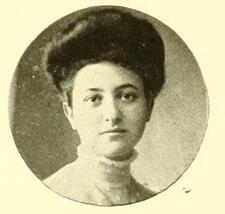
Edith Somborn Isaacs
Edith Somborn Isaacs made an impact on New York City both through her own volunteerism and by successfully running her husband’s campaigns for public office.
Janie Jacobson
Combining her Jewish background with her skill and penchant for writing, Janie Jacobson succeeded as a biblical playwright in the early twentieth century. The children’s plays she authored were performed nationally. In addition to being an accomplished writer, she was a talented musician and involved in Jewish social activism.
Anna Maria Jokl
Author, psychoanalyst, and scriptwriter Anna Maria Jokl was greatly influenced by the many places she lived: Vienna, Berlin, Prague, London, Zurich, and Jerusalem. Forced to flee countries twice because of Nazism, Jokl is best known for her German children’s books. Her prolific career includes accomplishments in radio broadcasting, psychoanalytic writing, and autobiographical prose.
Helen Joseph
An internationally renowned puppeteer and author on marionettes, Helen Haiman Joseph made a career entertaining and educating audiences of all ages with the performance of puppetry. She created the Pinocchio Players in 1924, writing and producing plays for clubs, schools, and hospitals. Joseph also wrote several children’s books.
Miriam Kainy
Miriam Kainy, Israel’s first established woman playwright, won the Israel Prime Minister’s Literary Prize in 1997. All sixteen of her plays were written in Hebrew and produced by Israel’s established theater companies. Kainy has also written manuscripts for radio and television and adapted dramas from English and Yiddish into Hebrew.
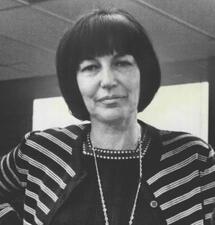
Fay Kanin
Over a sixty-year career as a writer, actor, co-producer, and activist, Fay Kanin was awarded several Emmys and Peabodys, the ACLU Bill of Rights Award, the Crystal Award from Women in Film, the Burning Bush Award from the University of Judaism, and nominations for Oscar and Tony awards. She was the second female president of the Academy of Motion Picture Arts and Sciences.
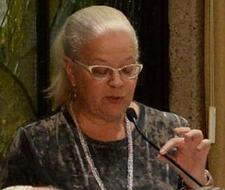
Judith Katzir
Yehudit Katzir (b. 1963) is an Israeli author who emerged as a leading female voice in what had been a male-dominated literary field until the 1980s. Her novels and short stories are noted for their idiosyncratic and lyrical language, as well as their focus on female identity and treatment of taboo themes.
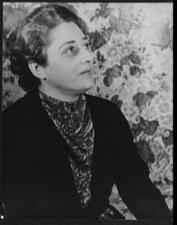
Beatrice Kaufman
Regarded as one of the wittiest women in New York during the 1930s and 1940s, Beatrice Kaufman edited important works of modernist poetry and fiction, published short stories of her own in the New Yorker, and saw several of her plays produced on Broadway. Her life demonstrated that a perceptive, ironic, and acculturated Jewish woman could become a valuable contributor to New York’s literary subculture.
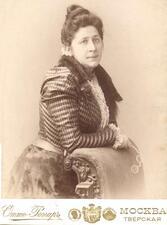
Rashel Mironovna Khin
Rashel Mironovna Khin hosted salons that made her the toast of Imperial Russia, and, with the help of the novelist Ivan Turgenev, became the first Jewish woman to publish major literary works in the Russian language. As an affluent member of the Jewish merchant class, she received a first-class European education and portrayed the anxieties of the Russian-Jewish elite in her fiction.
Gertrud Kolmar
Gertrud Kolmar was a prolific German-Jewish poet. Kolmar published three collections of poetry during her lifetime, primarily detailing the experiences of women as mothers, childless women, lovers, mourners, travelers, and the persecuted. Kolmar’s work is a vehicle for readers of the early twenty-first century to come to terms with the events of the Shoah.
Shulamit Lapid
Shulamit Lapid is an Israeli-Jewish novelist and playwright born in 1934. Her literary work focuses on feminism, social consciousness, and immigration to Israel.
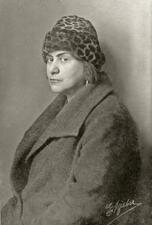
Else Lasker-Schüler
Else Lasker-Schüler was a German-Jewish poet, short story writer, novelist, and playwright. Born in Elberfeld (today part of Wuppertal, Germany) in 1869, Lasker-Schüler is best known for her dream-like, bohemian poetry.
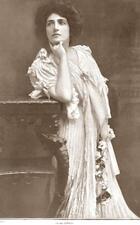
Clara Lipman
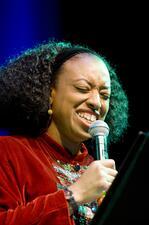
Yavilah McCoy

Annie Nathan Meyer
Annie Nathan Meyer promoted women’s higher education and founded Barnard College, New York’s first liberal arts college for women. She also chronicled women’s work, dramatized women’s status in plays, novels, and short stories, and raised funds for Jewish and black students to attend Barnard.


